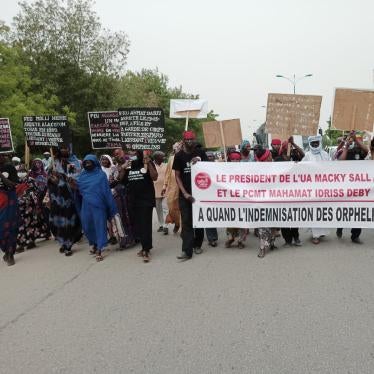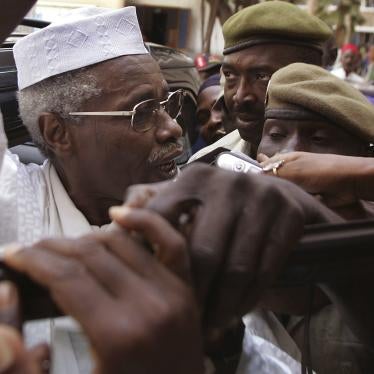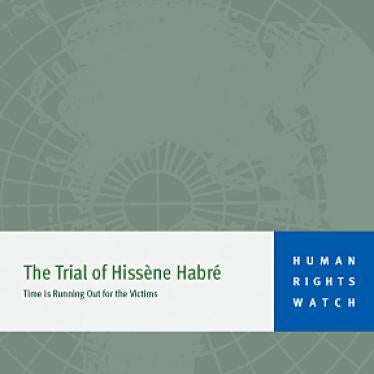(Dakar) – The victims of the late Chadian President Hissène Habré have yet to receive any reparations, six years after his historic conviction in Senegal, seven organizations said today.
On May 30, 2016, Habré, who died in August 2021, was convicted of crimes against humanity, war crimes, and torture, including sexual violence and rape, by an African Union-backed Senegalese court and sentenced to life in prison. In a separate trial in Chad, a court on March 25, 2015, convicted 20 Habré-era security agents on murder and torture charges. Both courts ordered millions of dollars in victim compensation. The African Union and the government of Chad should fulfill their obligations to the victims under these court orders, the organizations said.
“Habré’s victims fought relentlessly for 25 years to bring him and his henchmen to justice, and were awarded millions of dollars, but they haven’t seen one cent in reparations,” said Jacqueline Moudeina, lead counsel for the victims. “Many of the victims who ultimately achieved these historic victories are in dire straits and in desperate need.”
The Habré trial is the only one in the world in which the courts of one country convicted the former ruler of another for alleged human rights crimes and was widely considered “a milestone for justice in Africa.”
When an appellate court confirmed Habré’s conviction in April 2017, and awarded 82 billion CFA francs (approximately US$130 million) to 7,396 named victims, it mandated an African Union Trust Fund to raise the money by searching for Habré’s assets and soliciting contributions. Although the African Union has allocated US$5 million to the Trust Fund, the fund has yet to begin work. In September 2021, following Habré’s death and a renewed international interest in the victims’ plight, the African Union sent a delegation to Chad during which it took possession of a building for the Fund, which it described as “a decisive turning point in the process of reparations for the victims, and announced that it was “working to render the Fund operational within the shortest possible time.” Since then, however, and despite several promises, there has been no follow-up mission to Chad and to the best of the organizations’ knowledge no work has begun yet.
In the Chadian trial of Habré’s henchmen, the court also awarded 75 billion CFA francs (approximately US$119 million) in reparations to 7,000 victims, ordering the government to pay half and the convicted agents the other half. It ordered the government to erect a monument “in not more than one year” to honor those killed under Habré and to create a museum in the former political police (DDS) headquarters, where detainees were tortured. The government has not complied with any of these orders. In August 2017, a team of United Nations experts expressed their concern over the Chadian government’s failure to carry out reparations.
Victims and their representatives filed a case in 2017 before the African Commission of Human and Peoples' Rights (ACHPR) against Chad for failing to provide reparations to victims. That case is still pending five years later.
“The African Union and the Chadian government need to implement these court decisions so that the victims, at long last, can receive reparations for what we suffered,” said Clément Abaifouta, president of the Association of Victims of the Crimes of Hissène Habré (AVCRHH), who as a prisoner under Habré was forced to dig graves for many of his fellow inmates. “We fought for decades for those decisions and now the African Union and our government have made us fight again to get the decisions enforced.”
Habré’s one-party rule, from 1982 to 1990, was marked by widespread atrocities, including targeting certain ethnic groups and committing severe sexual and gender-based violence. DDS files recovered by Human Rights Watch in 2001 reveal the names of 1,208 people who were killed or died in detention, and 12,321 victims of human rights violations.
The organizations calling on the African Union and the government of Chad to make reparations are Amnesty International, The Association of Victims of the Crimes of Hissène Habré (AVCRHH), The Chadian Association for the Promotion and Defense of Human Rights (ATPDH), Human Rights Watch, the International Commission of Jurists, REDRESS, and the Rose Lokissim Association.









